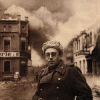Vasily Grossman

Vasily Grossman
Vasily Semyonovich Grossmanwas a Soviet Russian writer and journalist. Grossman was trained as an engineer and worked in the Donets Basin, but changed his career in the 1930s and published short stories and several novels. At the outbreak of the Second World War, he became a war correspondent for the Red Army newspaper Krasnaya Zvezda, writing firsthand accounts of the battles of Moscow, Stalingrad, Kursk and Berlin. Grossman's eyewitness accounts of a Nazi extermination camp, following the discovery of Treblinka,...
NationalityRussian
ProfessionJournalist
Date of Birth12 December 1905
CountryRussian Federation
Human history is not the battle of good struggling to overcome evil. It is a battle fought by a great evil struggling to crush a small kernel of human kindness.
In the cruel and terrible time in which our generation has been condemned to live on this earth, we must never make peace with evil. We must never become indifferent to others or undemanding of ourselves.
Man and fascism cannot co-exist. If fascism conquers, man will cease to exist and there will remain only man-like creatures that have undergone an internal transformation. But if man, man who is endowed with reason and kindness, should conquer, then Fascism must perish, and those who have submitted to it will once again become people.
The history of humanity is the history of human freedom...Freedom is not, as Engels thought, "the recognition of necessity." Freedom is the opposite of necessity. Freedom is necessity overcome. Progress is, in essence, the progress of human freedom. Yes, and after all, life itself is freedom. The evolution of life is the evolution of freedom.
There was something terrible, but also something sad and melancholy in this long cry uttered by the Russian infantry as they staged an attack. As it crossed the cold water, it lost its fervour. Instead of valour or gallantry, you could hear the sadness of a soul parting with everything that it loved, calling on its nearest and dearest to wake up, to lift their head from their pillows and hear for the last time the voice of a father, a husband, a son or a brother...
Ivan tells Anna: "I used to imagine that being embraced by a woman . . . as something so wonderful that it would make me forget everthing . . . [But] happiness, it turns out, will be to share with you the burden I can't share with anyone else.
And in this silence of the dumb and these speeches of the blind, in this medly of people bound together by the same grief, terror and hope, in this hatred and lack of understanding between men who spoke the same tongue, you could see much of the tragedy of the twentieth century.
I don't believe in your "Good". I believe in human kindness.
He was endowed with the extraordinary powers of endurance characteristic of madmen and simpletons.
There's nothing more difficult than saying goodbye to a house where you've suffered.
Humanity will live as long as there are humans.
The divine impeccability of the immortal [Soviet] State turned out not only to have suppressed individual human beings but also to have defended them, to have comforted them in their weakness, to have justified their insignificance. The State had taken on its own shoulders the entire weight of responsibility; it had liberated people from the chimera of conscience.